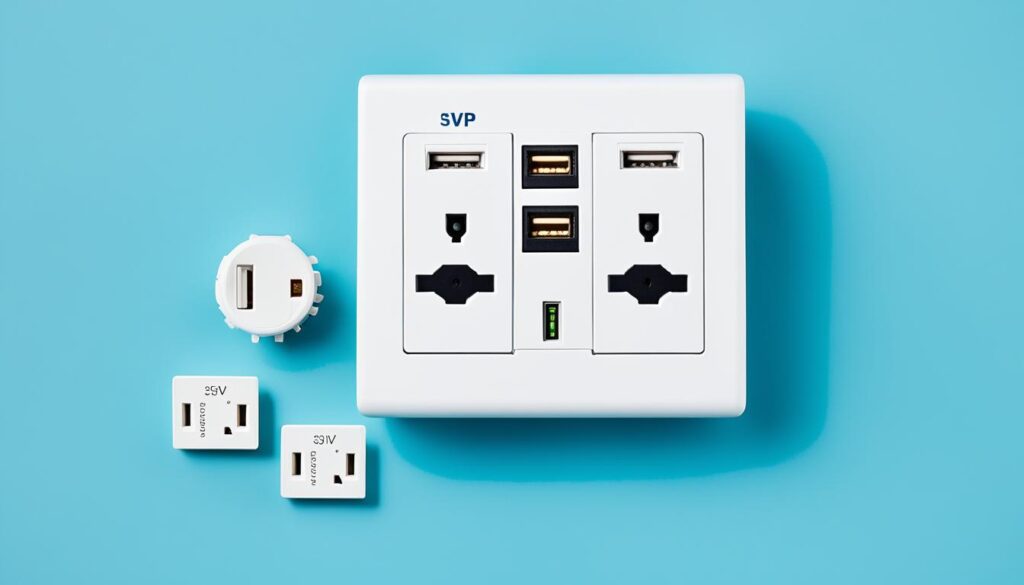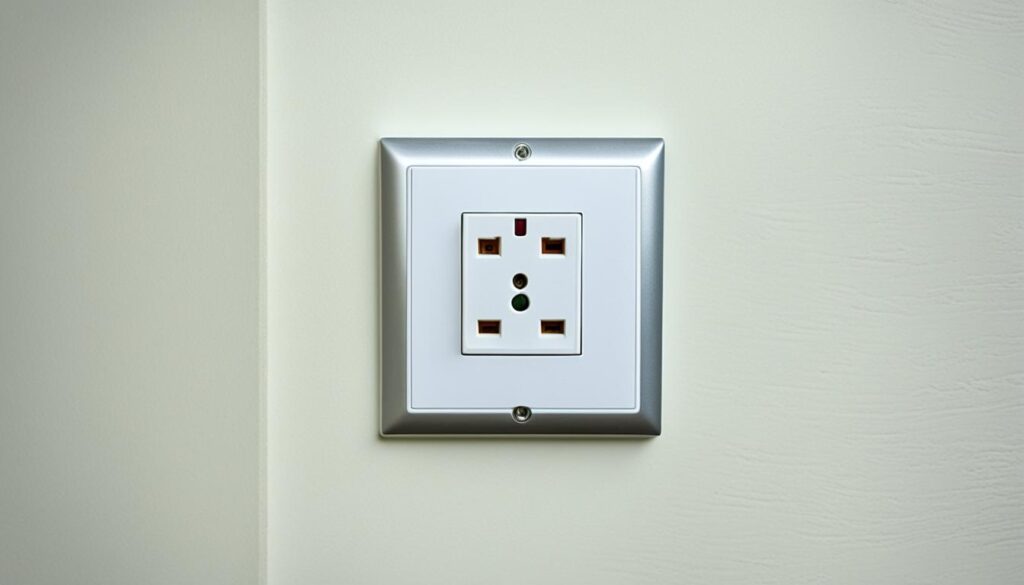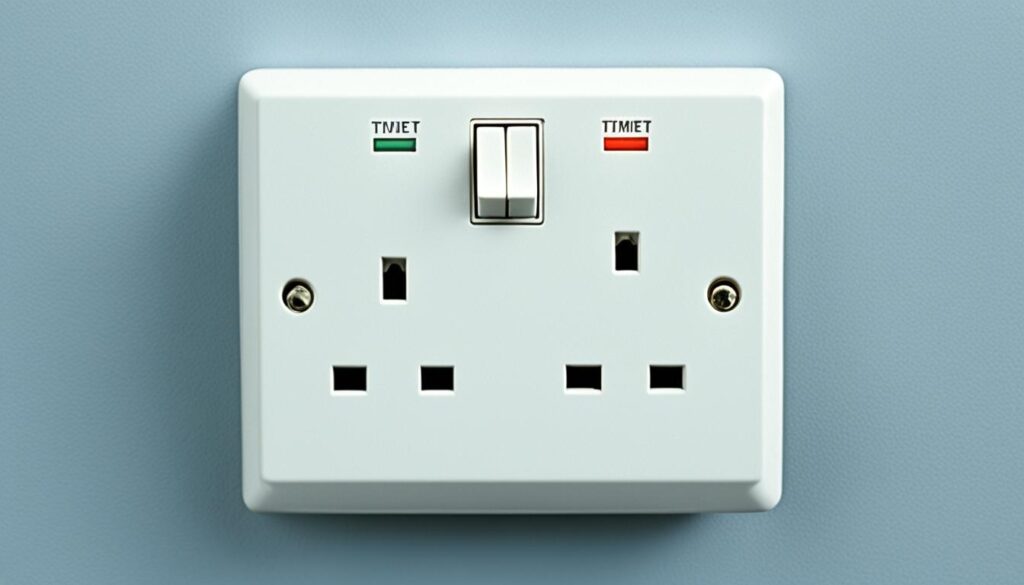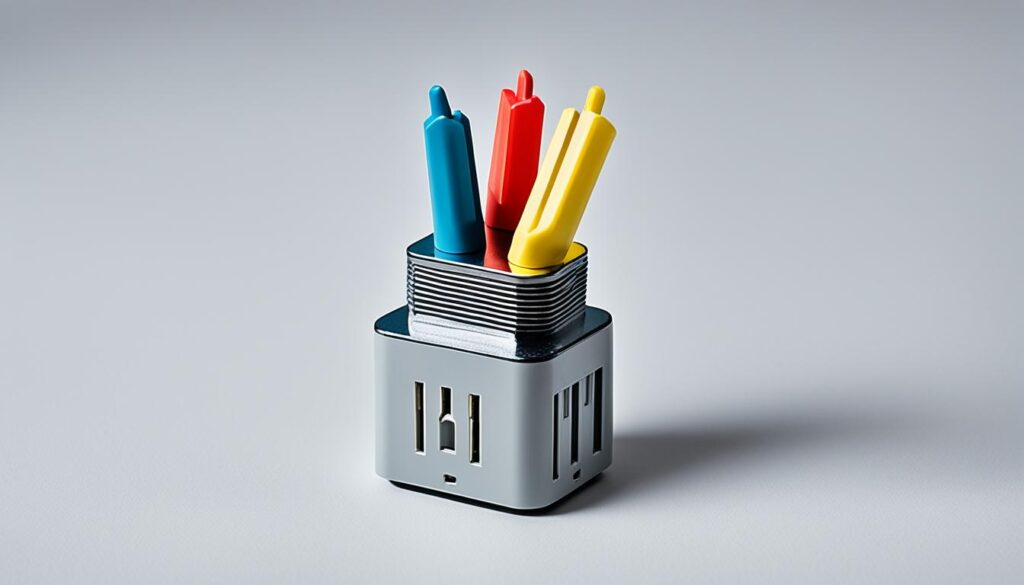When it comes to electrical connections in the United Kingdom, there are several power receptacle types you should be familiar with. Whether you need to charge your mobile phone, operate appliances, or create automated environments, understanding the different types of power receptacles is crucial.
Power receptacles, also known as electrical outlets, wall sockets, or plug sockets, provide the necessary connection for your devices to receive power. Each receptacle type has its advantages and applications, so it’s essential to choose the right one for your needs.
In this article, I will guide you through some of the common power receptacle types you’ll encounter in the UK. From USB mains sockets to remote-control mains sockets and mains timer sockets, we’ll explore their functions and benefits. We’ll also dive into the British standards for power plugs and sockets that ensure safety and compatibility.
Key Takeaways:
- There are various power receptacle types in the UK, such as USB mains sockets, remote-control mains sockets, and mains timer sockets.
- USB mains sockets are handy for quick charging of devices like mobile phones.
- Remote-control mains sockets offer automation and better-connected environments.
- Mains timer sockets allow you to set specific operational hours for your devices.
- The British standards, particularly BS 1363, define safety features and specifications for power plugs and sockets in the UK.
USB Mains Sockets
A USB mains socket is a convenient accessory that can be found on a standard mains plug socket. The USB port is usually located on either the top or side of the socket, making it easily accessible. In recent years, USB mains sockets have gained popularity in the UK due to their practicality. These sockets provide a simple and efficient way to connect and charge devices such as mobile phones.
With a mains plug that has a USB socket, users can power or charge their appliances using a USB cable. This eliminates the need for separate USB chargers or adapters and simplifies the charging process. Whether you want to charge your mobile phone or power a USB-powered device, a USB mains socket offers a user-friendly solution.
Considering how essential mobile phones have become in our daily lives, having USB mains sockets installed in your home or office can greatly enhance convenience and efficiency. Instead of searching for a USB charger or struggling with tangled cables, you can simply plug your device into a USB mains socket for quick and hassle-free charging.

The Benefits of USB Mains Sockets
- Convenience: USB mains sockets provide a dedicated power source for charging mobile phones and other USB-powered devices without the need for additional adapters.
- Space-saving: With USB mains sockets, you can free up valuable outlet space by eliminating the need for separate USB chargers.
- Fast charging: USB mains sockets are designed to deliver optimal charging speed, ensuring your devices are powered up quickly and efficiently.
- Compatibility: USB mains sockets are compatible with a wide range of devices, including smartphones, tablets, cameras, and more.
- Future-proof: As USB technology continues to evolve, USB mains sockets can adapt to new standards, ensuring compatibility with the latest devices.
Remote-Control Mains Sockets
When it comes to creating better-connected environments and automating your electrical devices, remote-control mains sockets offer a convenient solution. These innovative sockets allow you to easily select which socket you want to activate, providing greater control over your appliances and devices.
To set up a remote-control mains socket, simply plug the receiver socket into the wall and connect your device or appliance to the socket. Once connected, you can easily control the power to the socket using a remote control. This allows you to turn on or off the socket with just a press of a button, making it ideal for hard-to-reach sockets or managing devices in different parts of a room.
Remote-control mains sockets not only provide convenience but also offer the potential to create more automated environments. By integrating these sockets into your home or workspace, you can schedule when certain appliances or devices should be active. This level of automation can help you save energy, enhance security, and improve overall efficiency.
To simplify the process of connecting your devices to remote-control mains sockets, you can also use remote-control mains socket adaptors. These adaptors are designed to seamlessly connect your devices to the remote-control socket, ensuring a straightforward and hassle-free setup.
Whether you want to turn off lights from the comfort of your bed or automatically power on specific devices when you arrive home, remote-control mains sockets provide a convenient and versatile solution. Say goodbye to manually switching power on and off and embrace the benefits of automation with remote-control mains sockets.
Benefits of Remote-Control Mains Sockets
“The convenience of remote-control mains sockets is unmatched. Being able to control the power to your appliances with a simple remote control is not only convenient but can also help save energy and improve the overall efficiency of your home or workspace.” – James Thompson, Home Automation Enthusiast
| Benefits of Remote-Control Mains Sockets |
|---|
| Convenient control of power to appliances |
| Automation possibilities for energy savings |
| Improved efficiency and convenience |
| No need to manually switch power on and off |

With remote-control mains sockets, you can effortlessly create a better-connected environment and automate your electrical devices. Take control of your power supply and experience the convenience and benefits of these innovative sockets in your daily life.
Mains Timer Sockets
A mains timer socket is a convenient and practical solution for controlling the operational hours of electrical devices. With this type of socket, users can easily set a timer to specify the duration they want the socket to be active, ensuring energy efficiency and optimized usage of electrical appliances.
In essence, a mains timer socket operates on a similar principle to automatic lights, which only switch on during pre-set active hours. By utilizing a timer, users can schedule when the socket will be powered, saving energy and reducing electricity consumption. This is especially beneficial for applications such as outdoor lighting, where users can program the socket to activate at dusk and deactivate at dawn.
Additionally, mains timer sockets are highly useful in commercial and industrial environments. In such settings, it is often necessary to limit the operational hours of specific equipment or machinery. By employing digital mains timer sockets, businesses can easily program the sockets to activate only during specified operational hours, ensuring that the devices are automatically powered on and off as needed. This feature helps to minimize energy wastage and prolong the lifespan of the equipment.
Furthermore, mains timer sockets can be utilized for various purposes in different settings. For example, they can be employed to control lighting systems in office spaces, ensuring that lights are switched on and off according to the working hours. In retail environments, mains timer sockets can be used to manage the activation of display showcases or electrical signage during business hours. These sockets offer a high level of convenience and efficiency in controlling the power supply to different devices.
When using mains timer sockets, it is important to consider the specific requirements of the electrical devices and the desired operational hours. Some timer sockets offer options for setting daily schedules, while others provide the flexibility of programming on a weekly basis. Users can choose the model that best suits their needs and preferences, ensuring that their electrical devices are powered when required and remain inactive during non-operational hours.
Benefits of Mains Timer Sockets:
- Energy savings by controlling operational hours
- Convenience and automation in managing power supply
- Prolonged lifespan of electrical devices
- Optimized usage of lighting systems
- Flexible programming for different scheduling needs
| Applications | Benefits |
|---|---|
| Residential | Reduces energy consumption and provides enhanced security through timed lighting |
| Commercial | Improves energy efficiency and automates power control for various equipment |
| Industrial | Helps manage operational hours of machinery, reducing energy waste and optimizing productivity |
In summary, mains timer sockets offer a practical solution for controlling the operational hours of electrical devices. By enabling users to set timers and schedule power supply, these sockets contribute to energy savings, enhanced convenience, and automated power management. Whether in residential, commercial, or industrial environments, mains timer sockets provide a cost-effective and efficient way to regulate the power usage of various electrical appliances and systems.

British Standards for Power Plugs and Sockets
When it comes to power plugs and sockets in the United Kingdom, there are specific standards that ensure safety and compatibility. The most widely recognized standard is BS 1363, which governs the design and specifications of single-phase AC power plugs and sockets in the UK.
BS 1363 introduced several key features that have become synonymous with British power plugs and sockets. One distinctive feature is the presence of shutters on the neutral and line socket holes, providing enhanced protection against accidental contact with live parts. Additionally, BS 1363 mandates the inclusion of a fuse in the plug, adding an extra layer of safety.
Prior to the introduction of BS 1363, the British Standard for power plugs and sockets was BS 546. However, BS 1363 replaced BS 546 with its enhanced safety features and improved design.
BS 1363 Plugs: Type G Plugs
BS 1363 plugs, commonly known as Type G plugs, adhere to the standards outlined in the IEC 60083 plugs and sockets standard. Type G plugs are recognized by their three rectangular pins arranged in a triangular fashion. The larger pin is the earth pin, followed by the neutral and line pins.
These British plugs are designed for single-phase AC applications and are widely used in the UK for residential, commercial, and industrial purposes. The Type G plug and socket configuration provides a secure and reliable electrical connection, meeting the stringent safety requirements set by British standards.
To illustrate the characteristics of BS 1363 plugs, here is a table outlining the key specifications:
| Plug Specification | Details |
|---|---|
| Plug Type | Type G |
| Number of Pins | 3 |
| Pin Arrangement | Triangular arrangement with earth, neutral, and line pins |
| Shutters | Yes, on neutral and line socket holes |
| Fuse | Yes, integral in the plug |
| Applications | Residential, commercial, and industrial |
Please note: Image is for illustrative purposes only and does not represent the actual plug specifications.

The British standards for power plugs and sockets ensure that electrical connections in the UK are safe, reliable, and compatible. Adhering to the specifications of BS 1363 and using Type G plugs provides peace of mind and protection against electrical hazards.
Common Characteristics of British Mains Plugs and Sockets
British mains plugs and sockets for domestic use have certain common characteristics. These plugs and sockets feature solid and large brass pins compared to others. The pins are arranged in a triangular fashion, with the earth pin being the largest and longest.
The sockets are designed to prevent the exposure of bare energized contacts, ensuring safety during usage. They incorporate safety features such as insulated sleeves and blocking shutters, further enhancing protection for users. These safety measures reduce the risk of electric shocks and accidental contact with live parts.
The presence of a protective earth connection in British mains plugs and sockets provides an additional layer of safety. In the event of any contact with live parts within the appliance, the protective earth acts as a safeguard, diverting any electrical faults away from the user.
These common characteristics of British mains plugs and sockets reflect the commitment to safety in electrical installations. The use of solid brass pins, triangular pin arrangement, safety blocking shutters, insulated sleeves, and protective earth connection contribute to the overall integrity and reliability of the electrical infrastructure.
Conclusion
In conclusion, understanding the various types of power receptacles in the UK is essential for ensuring proper connectivity and safety for all your devices at home and work. The range of options, including USB mains sockets, remote-control mains sockets, and mains timer sockets, offers convenience and automation possibilities. British standards for power plugs and sockets, such as BS 1363, provide a standardized and safe approach to electrical connections. By familiarizing yourself with these power receptacle types and standards, you can make informed decisions about your electrical needs in the UK.

